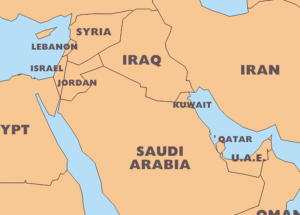“The map, the image of ‘historic Palestine’ that supposedly got torn apart by Zionist-European settler-colonialism, precisely conforms to borders that British and French colonial powers drew to suit their imperialistic goals.”
 Beirut, October 12 – Middle Eastern regimes that expend significant effort denouncing the institution and effects of foreign empire-building at the expense of local populations and political autonomy nurture a blind spot for the integrity of their countries’ boundaries, sources indicate, lines that such empires drew to suit their own geopolitical interests but have somehow become sacrosanct to the despots who now rule here.
Beirut, October 12 – Middle Eastern regimes that expend significant effort denouncing the institution and effects of foreign empire-building at the expense of local populations and political autonomy nurture a blind spot for the integrity of their countries’ boundaries, sources indicate, lines that such empires drew to suit their own geopolitical interests but have somehow become sacrosanct to the despots who now rule here.
Leaders in Beirut, Damascus, Baghdad, Cairo, Amman, Riyadh, Muscat, Manama, Kuwait City, Dubai, and other capitals in the Levant and North Africa dedicate sizable sums toward the maintenance of sovereignty within borders that British or French colonial rulers established more than a century ago, and that, by means not yet understood, now represent inviolable frontiers, the preservation of which represent axiomatic points of national pride. The same pride demands that those societies, and Arab society at large, denounce the depredations and long-term impact of that foreign rule, the removal of which during the first half of the twentieth century helped forge Arab patriotism in the first place.
Even entities whose political status falls short of full sovereignty have adopted this paradoxical attitude, observes analyst M. Bezzling. “Look at declared Palestinian ambitions,” he instructed. “The map, the image of ‘historic Palestine’ that supposedly got torn apart by Zionist-European settler-colonialism, precisely conforms to borders that British and French colonial powers drew to suit their imperialistic goals, and not, as one might expect, boundaries that reflect indigenous culture or affiliations of some sort.”
The odd shape of the state of Jordan illustrates the phenomenon, added Bezzling. “That weird panhandle, sticking out to the east toward Iraq, was to maintain a buffer between British petroleum interests in Saudi Arabia and French-controlled territory in Syria and Lebanon,” he explained. “With Israel the notable exception in the region, all the regimes owe their emergence and borders to faraway diplomats and politicians carving out spheres of influence, and ever since, they have fought like lions to keep hold of those foreign-mandated shapes, all the while declaring bitter opposition to those foreign Western imperialists and all that malign ‘foreign influence.'”
Numerous such regimes and associated parties have also declared that once the undesirable foreign influence, in the form of that one Jewish state in whatever borders, is expelled from the region, peace will prevail and none of the remaining nations will dream of encroaching on the sacred frontiers of any of their sovereign neighbors no matter how tempting they might find it as a way to divert domestic attention from governmental incompetence and corruption.
Please support our work through Patreon.



